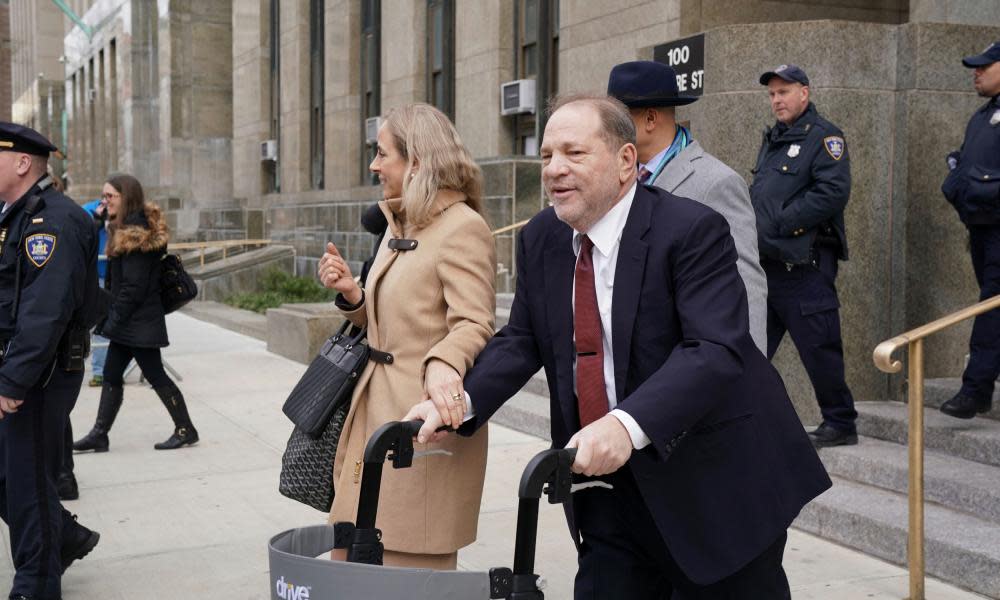Harvey Weinstein trial: accuser described alleged assault to roommate

Miriam Haley, one of the two main accusers of Harvey Weinstein at his sex crimes trial in New York, described to her roommate soon after the alleged attack how she was sexually assaulted by the movie producer in his Soho loft, the jury heard on Tuesday.
Related: 'I realized I'm being raped': accuser gives tearful testimony at Weinstein trial
The roommate, Elizabeth Entin, described a conversation she had with Haley in the Manhattan apartment they shared in summer 2006. She was lying on her bed reading, she said, when Haley appeared in the doorway.
Entin said Haley “was very nervous, she was pacing and seemed anxious. She told me she had gone to the apartment of Harvey Weinstein, she had assumed it was work-related but he started rubbing her shoulders and kissing her as she said ‘No, no.’”
Entin, who was then an assistant fashion stylist, recalled what Haley told her.
“She said, ‘I’m on my period.’ He said, ‘I don’t care,’ at which point he threw her down while she was still saying ‘No.’”
The witness said she remembered Haley telling her Weinstein ripped out her tampon “and went down on her while she was still saying ‘No.’ I said, ‘Miriam, that sounds like rape.’ I said, ‘Why don’t you call a lawyer?’”
Entin is the main supporting witness called by the prosecution to bolster the accusations of Haley, a former production assistant who worked for Weinstein on the TV show Project Runway and who testified on Monday. Haley’s allegations form one of the two pillars of the case.
Weinstein is charged with five counts, one of which is that he committed a criminal sex act – forcible oral sex – on Haley. He also faces two counts of rape relating to another woman who has yet to testify. Facing life in prison, he denies all charges and claims of sexual misconduct.
Four other women will be called as supporting witnesses in an attempt to prove a predatory pattern of sexual assault.
Weinstein’s lawyers have aggressively pursued prosecution witnesses in an attempt to discredit their accounts as fabricated or motivated by a desire to extract money from the Hollywood titan. Such tactics were displayed towards Entin.
In exchanges with lead defense attorney Donna Rotunno, Entin reacted sharply to suggestions she advised Haley to call an attorney, rather than the police, because she thought there was money in it.
Entin objected, saying: “I was thinking if anyone was a victim of sexual assault they should stand up for themselves in a criminal prosecution as they are entitled to.”
Rotunno asked why Entin never advised her roommate to avoid Weinstein.
“I did not think that was my place, and I thought an older man could certainly contain himself,” the witness replied.
Following heated disagreements between lawyers out of the earshot of the jury, judge James Burke allowed prosecutors to show jurors a series of photographs of Weinstein at different stages in his career. One had him smiling beside former president Bill Clinton. Joan Illuzzi-Orbon, the lead prosecutor, told the court the photos were designed to underline the power wielded by Weinstein.
“The witnesses say the power differential between them and Harvey Weinstein was tremendous – you have a woman brought up in a dairy farm … he was everything and she was nothing.”
The judge permitted the Clinton photograph to be introduced as evidence. But Burke declined to allow the prosecution to show the jury photos of the defendant in the company of Hillary Clinton, former vice-president Al Gore and the Queen.
In the US, Rainn offers support at 800-656-4673 or by chat at Rainn.org. In the UK, the rape crisis national freephone helpline is at 0808-802-9999. In Australia, support is available at 1800Respect (1800-737-7328) or 1800respect.org.au. Other international helplines can be found at Ibiblio.org.

 Yahoo News
Yahoo News 
